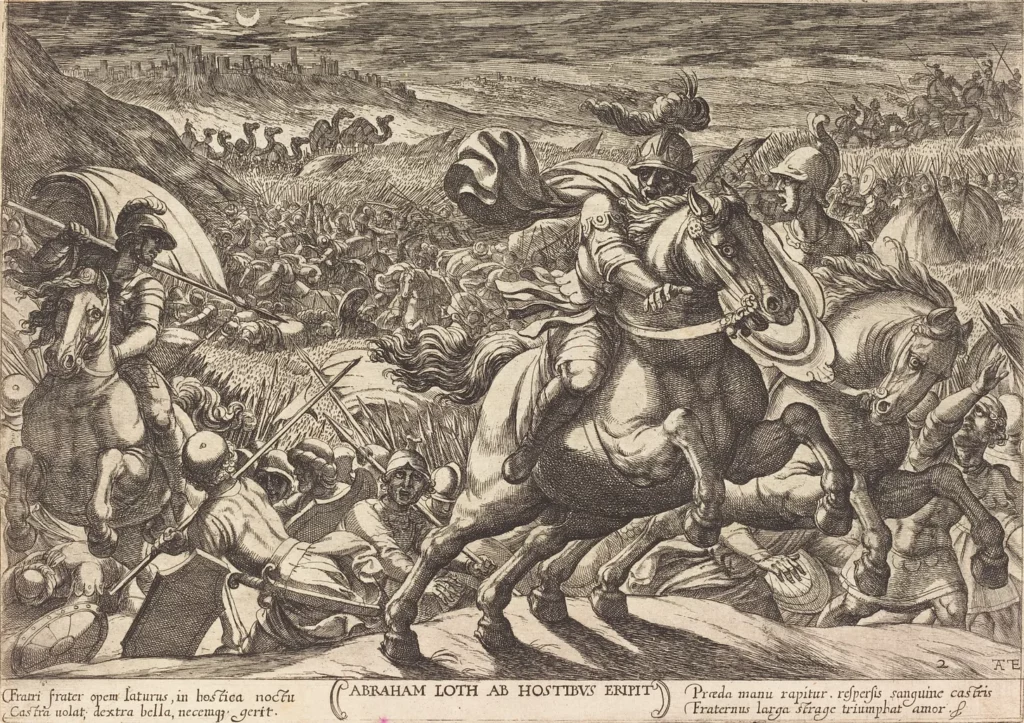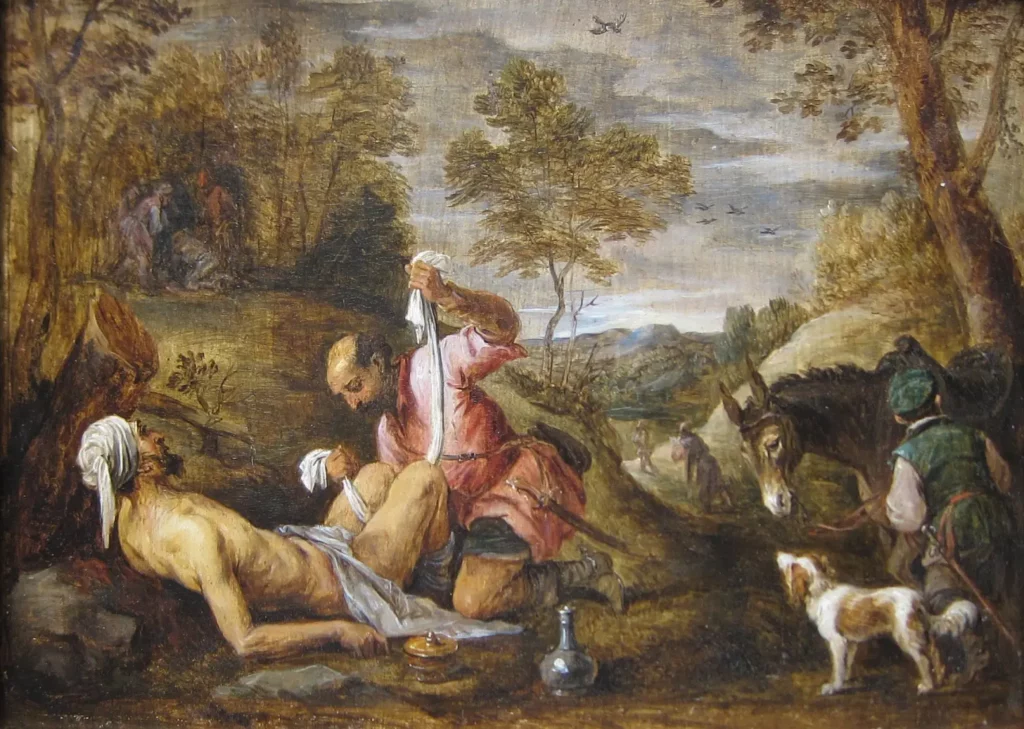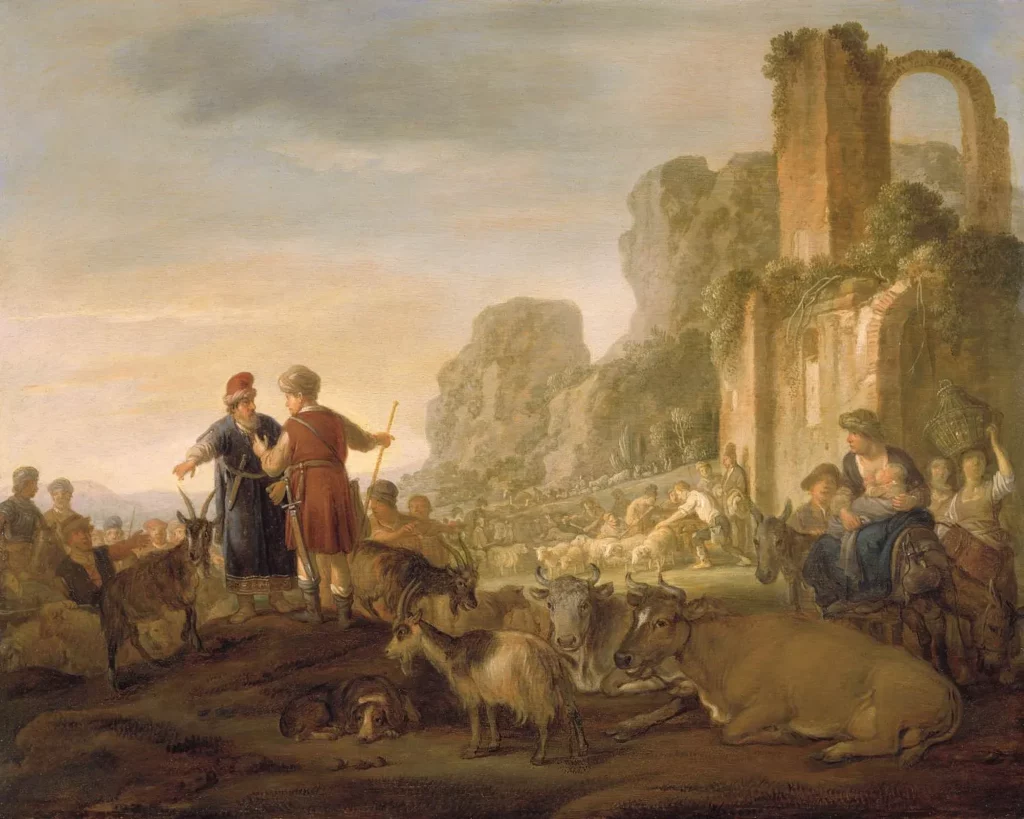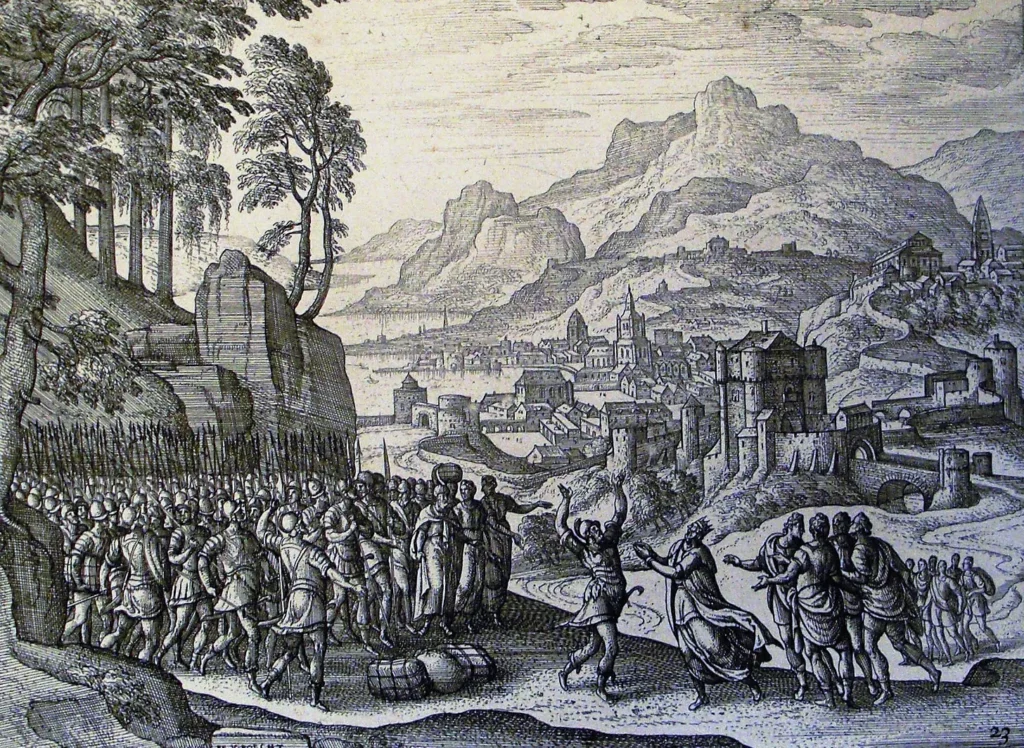They came to the other side of the sea, to the country of the Gerasenes. And when Jesus had stepped out of the boat, immediately there met him out of the tombs a man with an unclean spirit. He lived among the tombs. And no one could bind him anymore, not even with a chain, for he had often been bound with shackles and chains, but he wrenched the chains apart, and he broke the shackles in pieces. No one had the strength to subdue him. Night and day among the tombs and on the mountains he was always crying out and cutting himself with stones. And when he saw Jesus from afar, he ran and fell down before him. And crying out with a loud voice, he said, “What have you to do with me, Jesus, Son of the Most High God? I adjure you by God, do not torment me.” For he was saying to him, “Come out of the man, you unclean spirit!” And Jesus asked him, “What is your name?” He replied, “My name is Legion, for we are many.” And he begged him earnestly not to send them out of the country. Now a great herd of pigs was feeding there on the hillside, and they begged him, saying, “Send us to the pigs; let us enter them.” So he gave them permission. And the unclean spirits came out and entered the pigs; and the herd, numbering about two thousand, rushed down the steep bank into the sea and drowned in the sea.
The herdsmen fled and told it in the city and in the country. And people came to see what it was that had happened. And they came to Jesus and saw the demon-possessed man, the one who had had the legion, sitting there, clothed and in his right mind, and they were afraid. And those who had seen it described to them what had happened to the demon-possessed man and to the pigs. And they began to beg Jesus to depart from their region. As he was getting into the boat, the man who had been possessed with demons begged him that he might be with him. And he did not permit him but said to him, “Go home to your friends and tell them how much the Lord has done for you, and how he has had mercy on you.” And he went away and began to proclaim in the Decapolis how much Jesus had done for him, and everyone marveled.
– Mark 5:1-20, ESV
Economics of Glory exists to look at the spiritual and philosophical underpinnings of economics. Yet even for the most sympathetic of audiences, this passage might seem a strange one to examine through that lens. Demons? Pigs? Demonic pigs? Huh?
Trigger warning: This story talks about demons. As a result, there is a segment of people for whom it will be very tempting to dismiss outright the possibility that this story contains anything of value. Given the narrative arc, that would be an ironic tragedy. In keeping with the central idea of this piece, I plead with you: reserve judgment.
The passage begins with Jesus disembarking from a boat and being accosted immediately by a demon-possessed man. The man’s existence was desperate and horrifying. He lived chained among the tombstones to minimize the damage he could do to the surrounding community, if not himself. Day and night, he cried out and cut himself with stones. However, the situation had grown so dire that chains and shackles were no match for his strength. Things had reached a tipping point. Something had to give.
At this point, the Apostle Mark introduces us to a theme that repeats throughout the account: the revelatory power of pleading. Before exploring the specific details of each example in this passage, we must understand the logic involved in pleading. When do we plead? When the existence of someone/something that we love is threatened. Rich people don’t beg for money. Healthy people don’t beg to be healed.
But when he heard it, he said, “Those who are well have no need of a physician, but those who are sick.” – Matthew 9:12, ESV
This desperation differentiates begging from merely asking for something; there is a sense of humiliation involved in begging that people generally try to avoid at all costs. Begging is an activity and posture assumed by those desperate to rescue something that they value even more highly than being perceived as self-sufficient.
But when he heard it, he said, “Those who are well have no need of a physician, but those who are sick.”
– Matthew 9
Plea #1: The demons beg Jesus not to torment them, not to cast them out of the region, and finally beg him to let them enter the herd of pigs.12, ESV
Upon seeing Jesus, the demon-possessed man ran toward him, threw himself at his feet, and sardonically asked him, “What do you have to do with me, Jesus, Son of the Most High God? I adjure you by God, do not torment me.” Why?
The passage tells us immediately afterward: Jesus initiated the interaction with the man, commanding (not begging) the demons that had long inhabited and tormented him (and all his neighbors in the surrounding area as a result) to leave. Knowing that the gig was up, the demons were terrified of being punished for abusing the man; the torturers were afraid of being tormented. The irony here could not be thicker; to what authority do the demons appeal? “I adjure you by God.” So these demons, which live in categorical opposition to God, nonetheless have the nerve to invoke his name (his character, authority, and reputation) as a defensive shield against whatever they perceive that Jesus might do to them.
Amazingly, Jesus yields to them. He doesn’t destroy them.
The demons go further. They beg Jesus not to send them out of the region. Reknown ANE studies scholar Dr. Michael Heiser has written at length about the concept of territorial spirits in the Hebrew scriptures. The basic idea is that demons were given territory and restricted to those regions. The demons were terrified that they would be exiled from their land due to their behavior.
Again, Jesus grants their request.
Their final request is the most audacious: they ask Jesus to allow them to take a new victim upon leaving the man: a herd of 2,000 pigs grazing on the hillside.
Shockingly, Jesus again grants their request, allowing them to rush into the pigs.
The demons laid themselves bare in their three pleas to Jesus.
- In begging Jesus not to torment them, the demons sought to preserve their lives regardless of how they had ravaged the lives of others.
- By begging him not to exile them, the demons demonstrated how much they craved the authority they possessed and feared losing it.
- By requesting a new victim, the demons demonstrated an utter lack of remorse and an inability to consider the good of others. They prioritized their sadistic pleasure above all else, no matter the cost.
Plea #2: The Gerasenes beg Jesus to leave the region.
Immediately after the demons entered the pigs, they ran down a steep bank and all 2,000 drowned in the sea. As horrifying as it is to envision 2,000 pigs losing their lives, the color added in the ensuing verses paints an even bleaker outcome.
The verse that follows the story of the drowning pigs begins, “The herdsmen fled and told it in the city and in the country.” These weren’t wild pigs; these pigs belonged to someone. This was no mom-and-pop business; 2,000 pigs today would be worth in the neighborhood of $1.2 million. This business was likely an essential part of the Gerasene economy (which could explain part of why the herdsmen were so intent on spreading the news far and wide). And in a matter of seconds, it was gone.
How do the people of the Gerasenes respond? They beg Jesus to leave the region. This would seem logical, given that Jesus’ actions resulted in a substantial hit to their economy. However, the reality is much more complicated. Jesus wasn’t a wanton menace. He had restored the formerly demon-possessed man to his senses and saved the region from untold damage. So why did the people beg him to leave?
It was a business decision based on economic calculation.
What did they know?
- Jesus had rescued one of their citizens from suffering.
- Jesus was unpredictable, and guided by a value hierarchy radically different than theirs, which had cost them a lot of money.
How does Jesus respond to their pleas to depart the region?
He does as they ask. He gets back in the boat he arrived in and prepares to leave.
That brings us to the final plea.
Plea #3: The restored man begs Jesus to let him accompany him.
As Jesus got into the boat and prepared to leave, the man he had rescued pleaded with him: Let me come with you. Why?
It was a business decision based on economic calculation.
Put yourself in his shoes.
He had suffered for years. Estranged from family and friends. Living in a graveyard. His body covered in painful cuts and a lifetime of scars from cutting himself. Incapable of controlling his thoughts and actions.
In a moment, he’s free.
How does he want to deploy his freedom? The only thing he wants is to be with and serve the one who freed him.
This is a no-brainer, “Yes,” from Jesus, right? The Gospels are replete with examples of Jesus calling people to follow him who don’t, for one reason or another. Yet there’s only one thing that this man wants, which seems to align precisely with what humanity is supposed to want. These are Edenic desires; he wants to be with Jesus.
Jesus says no.
What is going on? Jesus seemingly says “Yes” to the people who want bad things and “No” to the one who wants good things. It’s baffling.
It seems like there is no pleasing this Jesus.
If we’re honest, there’s probably still a lot here that seems opaque, confusing, and/or outright immoral.
- Why would God allow a man to be tormented by demons for years in the first place?
- Why did Jesus give the demons what they asked for, not once but three different times, instead of destroying them?
- Why did Jesus allow the demons to enter the pigs and permit them to immediately run down and drown in the sea, knowing that it would destroy a vital part of the local economy?
- Why didn’t Jesus allow the one person who “got” what he was doing to do accompany him and the other disciples?
Famed investor Charlie Munger once summarized part of how he approached investing by saying,
“Show me the incentives, and I will show you the outcome.”
It turns out Charlie has been pretty successful for a reason. Incentives matter immensely. However, more fundamental questions lie at the heart of the quest to discern someone’s motivations:
Who are they? What do they most value? What are they most afraid to lose?
Each of us has a baseline currency that sits enthroned at the core of who we are. Someone who lives in the United States for the first twenty years of their life and then does a semester abroad in Europe during college will find that living in a different currency is a constant challenge. Every price needs to be translated into “real money”: the currency they have known and used their entire life.
This same reality exists more foundationally across everything that has value. All individuals, families, and groups develop hierarchies of value. These hierarchies serve as a skeletal system upon which habits, hobbies, (and eventually) cultures, economies, and civilizations are built. They can’t simply be changed at the drop of a hat; they are rooted in a conviction about the nature of reality itself.
The fact that everyone has a value hierarchy does not mean they are all equally in touch with reality. A man who consistently consumes sugary foods will eventually find his physical health suffers. A family that does not appreciate and prioritize intentionally teaching and training its children will lose them to those who do. A nation that lionizes the accumulation of wealth and control will eventually sacrifice its citizens to pursue that goal. A culture that does not value having children will soon cease to exist.
So how was Jesus’ value hierarchy arranged? What did he want more than anything?
Someone once asked Jesus a very similar question, to which he replied,
“…I always do the things that are pleasing to (my Father).”
John 8:29, ESV
What pleased his Father? What was of greatest importance to Him?
“And he said to him, “You shall love the Lord your God with all your heart and with all your soul and with all your mind. This is the great and first commandment. And a second is like it: You shall love your neighbor as yourself. On these two commandments depend all the Law and the Prophets.”
Matthew 22:37-40, ESV
When Jesus spoke these words, none of the New Testament scriptures had been written yet. So the phrase “the law and the prophets” was shorthand for “the Bible from beginning to to end.” In saying that “on these two commandments depend all the law and the prophets,” Jesus is effectively saying that God’s value hierarchy can be summarized in those two commandments.
What was Jesus most afraid to lose?
In Jesus’ last moments the New Testament authors record Jesus asking God,
“My God, my God, why have you forsaken me?” – Matthew 27:46, ESV
Jesus’ moral framework was built upon an alloyed foundational commitment to the glory of God and the good of those made in His image. This was his calling. It was his life and joy.
This twin commitment to the low time preference good of others frequently set him at odds with high time preference people. Jesus was free enough to be able to speak the truth and do what needed to be done without being crippled by fear over what others (including government officials and influential religious leaders) might think or do to him.
He didn’t live to accumulate earthly wealth, influence, or fame. He was homeless and ministered primarily to those who could not repay him for his ministry to them: the poor and the sick, children and the elderly. He traveled the countryside and spoke free of charge to whoever would listen. He repeatedly tried to convince people not to follow him and refused to stoke the flame of his celebrity for personal gain.
Jesus’ life and priorities were as radical in his day as they would be in ours. Yet even two thousand years ago, his ideas weren’t novel; they had simply been bureaucratized and forgotten.
Now we know what motivated Jesus. So why did he allow all those things to happen to the Gerasenes?
They were all business decisions based on economic calculation.
Jesus cared for all of the people in this story and was so committed to their good that he was willing to say and do what they needed at the expense of their short-term happiness.
Firstly, why did God wait so long to do something about the demoniac’s suffering?
If that’s your question, you are not the first person to object to God’s role and timing in allowing suffering. The book of John records the story of Jesus’ disciples passing by a blind man and asking Him, “Teacher, who sinned, this man or his parents, that he was born blind?” The disciples can only fathom one possible point of origin for suffering: direct punishment for sin. Jesus responds by blowing up their faulty paradigm by attributing it to God’s desire to display his power in healing him. As modern western people, that idea offends us; are we just playthings to God? Does human suffering not move him? There are two things to consider: First, our being offended is not an indication of a proposition’s rightness or wrongness, goodness or badness, truthfulness or falsehood. The truth often offends because it forces shortsighted, self-interested people (in whose number all of us can be counted) to acknowledge that they aren’t nearly as wise as they believed and have built their lives upon an inaccurate understanding of the world. Jesus frequently offended people, and His response was simple:
“…blessed is the one who is not offended by me.”
Matthew 11:6, ESV
The Judge of all the earth will do right.
At the same time, there is another response to those for whom that question is borne out of genuine confusion and pain: the cross of Christ. In the cross, God demonstrated just how deeply moved he was by the devastation marked in so much of the human experience by tracing it to its source: a lack of trust in His own wisdom, kindness, and goodness that bore itself out in disobedience to his revealed will. In the cross, Jesus demonstrated his confidence in his Father’s trustworthiness by entrusting himself to him completely, even unto death. And he only had to wait three days to see if God would accept the price that he was willing to pay for the world.
Second, why did Jesus allow the demons to destroy one of the pillars of the Gerasene economy? We get our answer in how the Gerasenes responded. The pig herders went into town and told everyone who would listen what Jesus had done. Many came running to see Jesus for themselves. Upon arriving, they heard the story recounted again: how Jesus had both healed the oppressed man and cast the demons into the herd of pigs, who ran down the hillside and met their demise in the sea. After taking a minute to assess the situation, they gathered together to ask Jesus to leave the region.
What was going on here? In that moment, the Gerasenes gathered on the hillside went into the risk management business. Having lost their livelihood at Jesus’ hands, they sought to mitigate future losses as well. The equation as they saw it was simple: $1.2 million worth of pigs was worth far more than the life of one man. Jesus’ actions were a net negative in their minds, and they acted accordingly.
However, this was shockingly shortsighted on their part. How?
Jesus had also miraculously healed the man that had terrorized their region for years.
There was a reason that they had chained the demon-possessed man; he was a mortal danger to them, their wives, and their children. In a moment, Jesus had not only rescued one of their brothers, but them as well. He brought peace to their region. They could only see what they had lost and were blind to what they had gained, which was of far more value than many pigs. This moral blindness led Jesus to do what he did; he was trying to help them see that they had gained the world but were in danger of losing their souls.
That wasn’t the only way their spiritual blindness had borne itself out. Think about it: Jesus was the most powerful man they had ever met. He stepped in to rescue a man who had lost his livelihood through no fault of his own. Yet it never occurred to them to ask Jesus to do the same for them. In investing terms, they saw the downside risk of Jesus, but couldn’t get past the loss of their herds to see the potential upside. Their love for and trust in the prosperity that their herds afforded enabled them to look Jesus (and the reality-reshaping power he had demonstrated) in the face and say, “Leave us alone.”
This is honestly one of the most terrifying passages in the entire Bible.
In the same way that Jesus had broken the demonic chains that bound their countryman, Jesus allowed a pilar of their economy to be destroyed in the hope of breaking the seemingly more innoculous (yet equally demonic) mammonic stranglehold on their lives. Why? Ultimately, so that that their “spirit(s) might be saved on the day of the Lord” (1 Corinthians 5:5).
Jesus responded by giving them what they asked. He was no tyrant, capriciously acting in self-interest. He didn’t need their approval or validation and thus wasn’t destroyed by their rejection. Every action and inaction on his part was for their good, and if they didn’t want him around, he was more than willing to depart. The Scriptures don’t even record that he said another word to them.
That brings us back to the reformed demoniac himself. What possible reason could Jesus have for denying his request to accompany him and his disciples when they departed? Why would Jesus reject the sanest man in the entire region?
Throughout the gospels, Jesus calls people to follow him, articulating the high cost involved. In Luke 14, Jesus states that following him involved renouncing anything that would compete with the absolute allegiance deserved by the King of all the earth. His disciples needed to be willing to forsake everything for him, whether parents, spouses, children, jobs, riches, or comfort. This seems to be what the former demoniac was doing. The contrast between his desires and the self-exalting desires that marked the demons and the residents of the Gerasenes could not have been starker.
Could it?
A phrase found in Luke 14 and Matthew 16 helps clarify what Jesus was doing.
Now great crowds accompanied him, and he turned and said to them, “If anyone comes to me and does not hate his own father and mother and wife and children and brothers and sisters, yes, and even his own life, he cannot be my disciple.”
Matthew 16:24
What does that have to do with the healed man? Christ taught his disciples to pray, “Hallowed be your name. May your kingdom come, and your will be done on earth as it is in heaven.”
It wasn’t that the man wanted something terrible. Not by a long shot. But his will didn’t align with Jesus’. Jesus had higher, different, and bigger plans for him. He told him that he would be of much more use to his kingdom by staying in his home region and being a living testimony to his kindness, power, and grace amid a people in desperate need of it.
As difficult as Jesus’ words may have been for him to hear, the man’s response demonstrated that there was indeed a cavernous expanse between his new desires and the selfish, high-time preference ones displayed by the demons and Gerasenes. Rather than protest and insist that he be allowed to accompany Jesus, he submitted to him and did as he asked, to the desired effect:
And he went away and began to proclaim in the Decapolis how much Jesus had done for him, and everyone marveled.
Mark 5:20, ESV
The restored man wouldn’t be the only one to beg God for something and receive a divine “No.” A short time later, in the Garden of Gethsemane, Jesus himself would beg his Father to let the metaphorical cup (representing his atoning death on the cross by which he would satisfy God’s wrath toward sin) pass before him undrunk, and he too would receive a divine rejection. Why? Did it result from some act of disobedience or selfishness on his part?
No.
It was the death by which he would most glorify and demonstrate the immeasurable value of his Father’s love, patience, and goodness toward his disobedient people. It was the way that Jesus would most vividly display the most accurate value hierarchy ever.
But his plea was equally as revelatory as the other three in the Mark passage above. Immediately after asking for God to let the cup pass, Jesus prayed,
“Nevertheless, not as I will, but as you will.”
The boy who (in his first recorded words in Scripture) told his parents that he had to “be about his Father’s business” had grown into a man and completed that work in motivation, word, and deed, proving himself a faithful son in his Father’s household economy. His reward for the humiliation he suffered was his exaltation as ruler over the entire universe and an inheritance denominated not in silver or gold but the most valuable of all God’s creations: people, redeemed and remade to embody the same righteous priorities that we had.
Unlike the first Adam, who needed to plead mercy for himself, Jesus, the last Adam, was able to freely fulfill the greatest commandment through earnest, selfless, love-borne pleas for his Father’s glory and interceding on behalf of his needy neighbors.
It’s at this point that we need to hear the words God spoke to Adam and Eve following their taking and eating of the forbidden fruit:
“Where are you?” – Genesis 3:9, ESV
Who do you most see yourself in among those who interacted with Jesus in this story? Some questions to reflect upon:
- What do your pleas and desires reveal about who you are and what you believe to be most real, true, and of utmost value?
- Whose kingdom are you building? Whose will do you want done? (Matthew 6:10) Where does your ultimate loyalty lie? What is the baseline currency in which you’re denominating your life in that kingdom? How sound is that currency?
- What kind of fruit is service of that kingdom producing in your heart and life?







